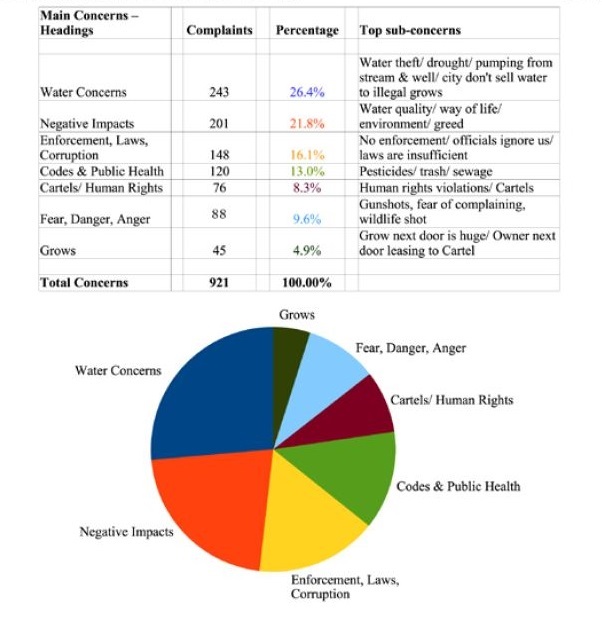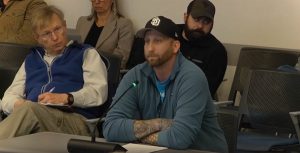Gov. Kotek asked about reports OWRD is targeting small farmers
5 min read
Like water, Oregon’s Water Resources Department is said to be taking the path of least resistance. At the Fruitdale Grange on June 11:
Christopher Hall (Water League, executive director): I’m Christopher Hall, executive director of Water League and our mission is to engage the public in water stewardship. We are your friends, and when you have concerns about water, you call us, and we are in your service to help you be able to achieve the results you want both in management and governance…
[00:00:27] So the problem is that the state has begun cracking down on small half-acre- to acre-sized gardeners who—and what they do is, they are feeding their neighbors. And they’re feeding their neighbors with the CSA (community supported agriculture), they’re feeding their neighbors at farmers market, maybe they’re doing people’s food stamps in front of their houses, but what’s happening is that for the first time in 70 years the state has started to crack down on these people.
[00:00:55] And it’s a really unfortunate situation because the people who are using this water are just a tiny, tiny fraction of all groundwater that’s out there. But the problem is that the state is targeting the most vulnerable farmers that exist in Oregon, and we’re just not going to let that happen.
[00:01:20] John Q: Water Resources was given greater legal authority after the release of Hall’s study of the Illinois River watershed.
[00:01:27] Christopher Hall (Water League, executive director): So some of you may know that in 2021, I was hired by the local soil and water conservation district to do an assessment of the impact that these large organized crime syndicates were having on our region.
[00:01:40] They disrupted a cannabis community that had been growing cannabis for over 60 years in their backyard. Never posed an existential threat to the communities of the watershed and we saw a 450% increase in just two years, in just the acreage alone, by these organized crime syndicates.
[00:01:58] I’ve compiled and made a report that is widely regarded as the most comprehensive of its kind anywhere, ever done. And that report has resulted in a couple of laws that got passed, but more importantly, it really pointed out just the amount of destruction that was done.
[00:02:20] And so I made my job and got 1,000 signatures and got a huge amount of people to write letters and demand that the Oregon Water Resources Department enforce the water laws and shut these organized crime syndicates down—big operations that brought in over 2,500 folks who were across the board creating human rights violations and trashing our watershed.
[00:02:41] And the responses that we got from the Water Resources Department was: ‘No. We’re scared.’ And so they never did a single thing about those people. And I have done aerial photography, and I had every single one of these things measured down to the one-foot resolution with knowledge about how much water they were using.
[00:02:57] And gave them every piece of information to go after these large organized crime syndicates and they refused, again, because they were scared. They did not send threat letters, they didn’t send any kind of cease-and-desist letters, they did absolutely nothing. And so, eventually the governor showed leadership and got them to hire a whole bunch of assistant watermasters across the state, and that’s why, it’s to address this problem.
[00:03:23] And what’s interesting is that now they’re actually going after the most vulnerable farmers and they’re showing up at their properties and they’re knocking on their doors and they’re not scared. And we feel that this double standard is really unfortunate, to go after the weakest among us.
[00:03:40] And to make matters worse, what they’re doing is they’re using the assistant watermasters that were hired to go after these big crime syndicates, and it’s in the news, and they’re using them to actually now go after small … farmers. And we know the Water Resources Department’s budget is way, way small for the work that, the mandates that they have, and the number of staff that they have is not nearly enough to do all the work that they need to do. And for them to be prioritizing this, is just shocking. And I just need to make sure that people understand that.
[00:04:14] John Q: The law has been on the books since 1955, but in its first 70 years has never been enforced. Enforcement now would serve to reduce the food supply, even as demand continues to rise.
[00:04:28] Christopher Hall (Water League, executive director): So, who’s familiar with Victory Gardens from World War II? Before 1955, we were able to sell food off our gardens. It was very, very clear in the water code,… that included any product sales whatsoever. And it said that you could use your domestic well, you could use it for your house, you could use it for your goats and your sheep and your cows and your horses, and you could also use it for your lawn and your personal garden…
[00:04:55] But all of a sudden in 1955 no more victory, no, no, we’re making it illegal. And what we did was they prohibited the use of water to irrigate that garden of yours if you sold a single tomato.
[00:05:10] Now, you’re still allowed a lawn or a garden for your own personal use, and in fact a combination thereof up to a half-acre. So we know that the issue was not about water volume, because you’re still irrigating the lawn. It was about shutting down local commerce and killing victory gardens that serve families. And the state never enforced it for 70 years because surely they all knew how absurd it was.
[00:05:36] And there’s no actual answer in the historical record that is positive that tells us why this happened. We do know that there were lobbyists involved pushing the 1955 Groundwater Act (which is by the way a very important act). But this is one issue that just like, just showed up and no one ever said anything about it.
[00:05:56] John Q: They’re trying to change that 1955 law. We asked if Gov. Kotek could share with the public her discussions with OWRD on how to protect the Illinois River watershed.




